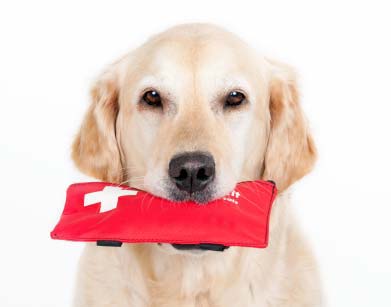There are several common health problems that may affect your dog during their lifetime, hence why so many opt to take out dog insurance cover. Most of the common illnesses or ailments are not life threatening. If you take measures to prevent or treat the ailments as soon as they occur; your dog is less likely to become seriously ill from these conditions. Below are some of the most common pet ailments that can affect your canine companion.
Arthritis - Arthritis is a common problem and one in five dogs over the age of seven usually has some form of arthritis. If you notice a change in your dogs daily routine or your dog starts to display signs of discomfort while exercising or when out for a walk you should take him to see your vet. There isnt a cure for arthritis, however, there are treatments and medications that can help your dog be more comfortable and allow them to stay active.
Arthritis can affect your pets hips, shoulders, joints, neck and back. There are two kinds of arthritis. Degenerative joint disease, also called osteoarthritis, is caused by stress on the joints. Inflammatory Joint Disease is usually caused by an infection. Some of the symptoms include loss of weight and fever. The most common causes of this condition is ticks and bacteria.
Worms There are many types of worms your pet could become infected with. The more common worms are Flatworms, Tapeworms, heartworms, hookworms, whipworms and lungworms. Worms are very common in dogs and are easily treated. Did you know that a puppy can be born with worms if their mother is infected. An adult dog can get worms from being bitten by fleas, ticks and even mosquitoes. While out playing in the parks they can easily pick up worms by eating or coming in to contact with dead birds, eating frogs and most commonly dog and cat feces. They could even share toys with an infected animal and pick up intestinal worms in this manner. It will not always be apparent that your dog or cat has worms, some worm infected pets show no symptoms initially while other worms cause diarrhea, weight loss and abdominal pain. Possibly one of the best indicators youre your dog or cat has worms is when they show a lack of energy and motivation to exercise. There are many different treatments ask your vet which one is right for your dog. Worms are not life threatening if you treat them properly. If you set up a regular worming programme you will not have to worry about your dog becoming infected. Most worm infections do not pass to humans, however some do. Ask your vet for more information if you are concerned about your family pet passing worms to your kids.
Anxiety Disorders - Anxiety Disorders are fairly common and recognising them and getting the proper treatment is key to keeping your dog healthy. An anxiety disorder can affect the dogs emotional and physical health. Some things that dogs are afraid of are things like thunder or fireworks. Sensitive dogs even become anxious when their owners raise their voices unexpectedly. A dog can also suffer from separation anxiety when left alone for long periods of time.
Studies have shown that this may be a genetic trait in some specific breeds of dogs. Some of the breeds include, Great Danes, German Shepherd, Jack Russell Terriers and Dalmatians. Some of the symptoms a dog may have include, barking, pacing, urinating in the house and licking themselves excessively. When a dog is in acute distress they may try to hide under a bed.
Your vet can run tests to see exactly what is wrong with your dog. Some of these symptoms could also be associated with other ailments. Once the vet has determined it is anxiety, then they will give you medications or treatments for your specific dog. A dog with anxiety disorders does not deal well with change so you should try to establish a daily routine for your pet. If you maintain a regular schedule of feeding, playtime and walking the dog will be much calmer.
Canine Allergies - Canine Allergies are very common in dogs. Dog allergies usually affect the skin and cause itching and a rash while other common allergic reactions may cause you pet to sneeze and or wheeze. Coughing is actually quite common too. There are three major causes of allergies in dogs. They are insects, with fleas being the most common and airborne allergens such as pollen, grass and mold. The third type is an allergic reaction to certain foods or medicines. Regularly airing your pets bed sheets and kennel, dusting and removing any mould will greatly help reduce the chances of common allergies from flaring up.
A dog will not always display an allergic reaction immediately after exposure; there is often a delayed reaction. One common symptom of allergies is if your dog constantly licks its paws. Other symptoms include face rubbing, head shaking and belly licking. A dog can also get hives from an allergic reaction and they usually disappear within 24 hours. You should consult your vet when you think your dog may be allergic to something. They will suggest the proper treatments. It is possible to have your dog tested for allergies if you are concerned. That way you will be able to prevent some allergies from occurring. Depending on what your dog is allergic to will depend on the treatment, such as changing a dogs diet or flea treatments.
Ear Problems - Ear problems in dogs are quite common and there are multiple causes, including wax, mites and bacteria. The most common ear problem is excessive ear wax build up or ear mites. Some dog breeds are more susceptible to ear problems than others are, especially breeds with hairy inner ear flaps, like miniature poodles and schnauzers. Did you know that underlying food allergies is the actual cause of ear infections in around 18 to 20% of dogs who have regular ear infections! A dogs ears should be cleaned and checked on a regular basis to prevent ear infections from occurring. A simple way to help keep your dogs ears healthy is to keep the hair from blocking the ears opening. You could trim the hair to allow air to flow into the ear which will help prevent ear infections.
Your vet is in the best position to determine what is wrong with your dogs ears and suggest the best treatment. Treatments usually include putting medicated drops in their ears and sometimes a vet will also give your dog an antibiotic. Always contact your vet before you treat your dogs ear infection as infections and treatments vary.
These are just a few of the common ailments that dogs tend to get at sometime in their lives. If you use preventive measures and keep an eye on your dogs behaviour; you will be able to keep them healthy and happy for their lifetime. Lastly dont forget pet insurance in case the unexpected happens!

 First Aid for a Dog Burns
Medically Treat Any Burn on Your Do
First Aid for a Dog Burns
Medically Treat Any Burn on Your Do
 Life With Weimaraners: Tips from a Breeder
Carole Lee Richards got her first W
Life With Weimaraners: Tips from a Breeder
Carole Lee Richards got her first W
 The Dangers of Picnics and Parties
The Dangers of Picnics and Parties to Dogs
The Dangers of Picnics and Parties
The Dangers of Picnics and Parties to Dogs
 Lyme Disease in Dogs Symptoms To Watch Out For
Early
Lyme Disease in Dogs Symptoms To Watch Out For
Early
 Shining a Light on Laser Therapy
Some veterinarians view low-energy
Shining a Light on Laser Therapy
Some veterinarians view low-energy